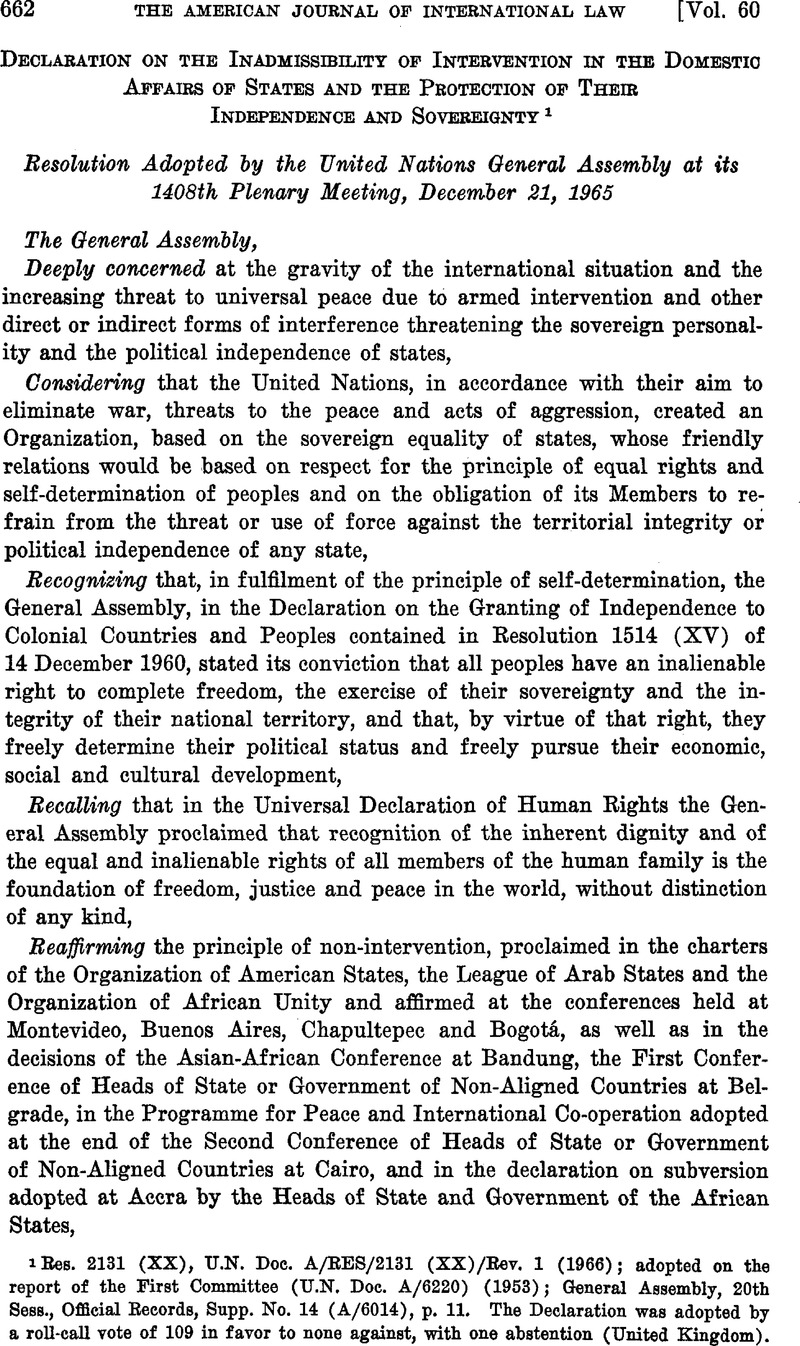No CrossRef data available.
Published online by Cambridge University Press: 28 March 2017

1 Annexed to Res. 2106 (XX), U.N. Doc. A/RES/2106 (XX) (1966); General Assembly, 20th Sess., Official Records, Supp. No. 14 (A/6014), p. 47. Adopted on the report of the Third Committee (U.N. Doc. A/6181, A/L.479) (1965). The Convention was adopted by a vote of 104 in favor to none against, with one abstention (Mexico), later changed to an affirmative vote. In explanation of the vote of the United States in favor of the Convention, the representative of the United States stated in the General Assembly: “For the record, however, here in this Assembly I wish to state that the United States understands article 4 of the convention as imposing no obligation on any party to take measures which are not fully consistent with its constitutional guarantees of freedom, including freedom of speech and association. This interpretation is entirely consistent with the opening paragraph of article 4 of the convention itself, which provides that in carrying out certain obligations of the convention, states parties shall have 'due regard to the principles embodied in the Universal Declaration of Human Rights and the rights expressly set forth in article 5 of this Convention.’ Article 5 in turn lists among its rights to be guaranteed without distinction as to race, color, or national or ethnic origin the right of freedom of opinion and of expression.” (54 Dept. of State Bulletin 216 (1966)). The statements of Mr. Goldberg in Committee II on Dec. 14, 1965, and of Miss Willis in the Plenary Session on Dec. 21, 1965, are reproduced ibid. 212. A United Nations Declaration on the Elimination of All Forms of Racial Discrimination had been adopted by the General Assembly on Nov. 20, 1963 (U.N. Doc. A/RES/ 1904 (XVIII) (1963); 58 A.J.I.L. 1081 (1964); 3 Int. Legal Materials 164 (1963)).
1 Bes. 2131 (XX), U.N. Doe. A/KES/2131 (XX)/Rev. 1 (1966); adopted on the report of the First Committee (U.N. Doc. A/6220) (1953); General Assembly, 20th Sess., Official Records, Supp. No. 14 (A/6014), p. 11. The Declaration was adopted by a roll-call vote of 109 in favor to none against, with one abstention (United Kingdom).
1 A/5887.
2 A/5791.
3 Official Records of the General Assembly, Nineteenth Session, Supplement No. 3 (A/5803), chapter VII, section III, para. 346.
4 A/5585, A/5790.
5 A/C.6/L.565.
6 A/5455 and Add. 1-6, A/5744 and Add. 1-4.
* On December 20, the General Assembly approved without objection the following membership for the Advisory Committee on Technical Assistance to Promote the Teaching, Study, Dissemination and Wider Appreciation of International Law: Afghanistan, Belgium, Ecuador, France, Ghana, Hungary, Union of Soviet Socialist Eepublics, United Kingdom, United Eepublic of Tanzania and United States.